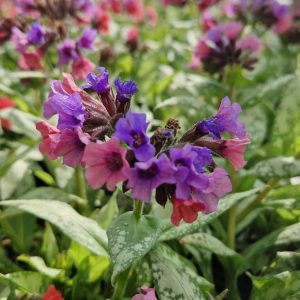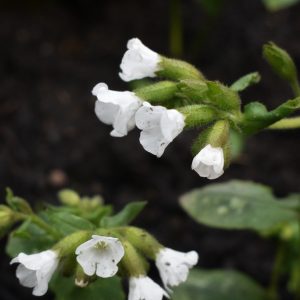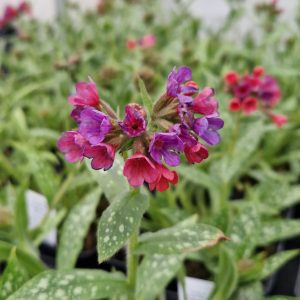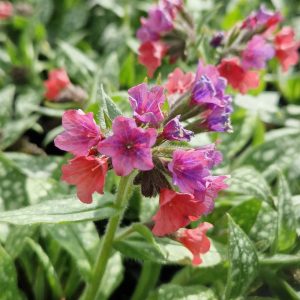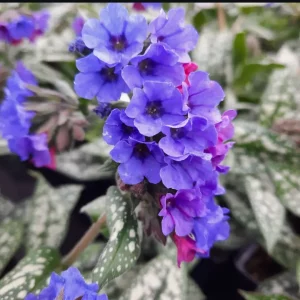Pulmonaria, also known as Lungwort, is a delightful perennial known for its charming spotted leaves and early spring blooms. Follow these planting guidelines to ensure the successful establishment of Pulmonaria in your garden:
Choose the Right Location
Light Conditions: Pulmonaria thrives in partial to full shade. Choose a location with dappled sunlight or filtered shade. Avoid intense, direct sunlight.
Soil Type: Plant in well-draining, moist soil. Pulmonaria prefers a slightly acidic to neutral pH soil.
Timing
Planting Season: The best time to plant Pulmonaria is in early spring or autumn. Planting during these seasons allows the roots to establish before the heat of summer or the cold of winter.
Planting Process
Digging the Hole: Dig a hole that is as deep as the root ball and twice as wide. Ensure there is enough space for the roots to spread.
Spacing: Plant Pulmonaria about 12 to 18 inches apart to provide ample room for growth.
Root Ball: Gently loosen the plant’s root ball before placing it in the hole. Position the plant so that it sits at the same level as it did in the nursery container.
Backfilling: Fill the hole with soil and press it down gently to remove air pockets. Water thoroughly after planting.
Watering
Initial Watering: Provide ample water immediately after planting to help the roots settle. Keep the soil consistently moist, especially during the first growing season.
Regular Watering: Pulmonaria appreciates regular watering. Ensure the soil remains evenly moist but not waterlogged.
Mulching
Apply Mulch: Mulch around the base of the plant to retain soil moisture, suppress weeds, and regulate soil temperature. Maintain a layer of 2-3 inches of mulch.
Fertilisation
Light Feeding: Pulmonaria generally doesn’t require heavy feeding. A balanced, slow-release fertiliser applied in early spring can provide the necessary nutrients.
Pruning
Deadheading: Remove spent flowers to encourage continuous blooming. Prune back any leggy or damaged foliage to maintain a neat appearance.
Division
Periodic Division: Every 3-4 years, consider dividing mature Pulmonaria clumps to rejuvenate the plant. Division is best done in early spring.
Pests and Diseases
Vigilant Monitoring: Keep an eye out for common pests like slugs and snails. Pulmonaria is generally resistant to diseases, but prompt action is needed if issues arise.
Winter Care
Mulch for Winter: Apply a layer of mulch in late autumn to protect the plant’s roots from winter frost. Mulch can also help prevent heaving caused by freeze-thaw cycles.
Companion Planting
Complementary Plants: Pair Pulmonaria with other shade-loving plants like hostas, ferns, or heucheras for a visually appealing and diverse garden.
By following these planting guidelines, you’ll establish a thriving Pulmonaria in your garden, providing you with years of enjoyment with its unique foliage and charming blooms.






